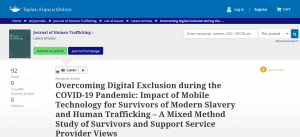Tackling digital exclusion for survivors of modern slavery during and beyond the COVID-19 pandemic
20 April 2022
Smartphones enable access to support, services and integration for survivors of modern slavery and should be considered an essential element of survivor support packages, a study published in the Journal of Human Trafficking has shown. Further research should explore how to optimise access to digital technology for survivors, exploring options for government support.
Anti-slavery charity Unseen UK and the telecommunications company BT, developed a project to understand how smartphones and access to data packages can enhance the recovery of survivors of modern slavery and human trafficking. Researchers based at the NIHR Applied Research Collaboration West (ARC West) and the Elizabeth Blackwell Institute at University of Bristol evaluated the impact that access to smartphones could have on the mental health and wellbeing of survivors.
Survivors of modern slavery (defined by the Modern Slavery Act 2015) may have experienced forced work through mental or physical threat or abuse, been dehumanised and treated as a commodity, or physically constrained, including being trafficked for sexual exploitation or forced labour.
Seventy-four survivors received a smartphone, SIM card and pre-paid credit that allowed calls, texts and a monthly 4GB data allowance for six months, donated from BT. Twenty-seven survivors were interviewed from 15 different nationalities, and 12 Unseen staff completed a survey about their perceptions of the impact that smartphones had. Survivors were invited to complete a capability wellbeing measure (ICECAP-A) at the start and end of the project. This is a holistic quality-of-life measure that focuses on a person’s current experience of independence, security, love and friendship, achievement and enjoyment.
The main findings from the research were that smartphones were highly valuable for support, integration and access to services and positively impacted survivors’ wellbeing:
“Having access to have a phone and internet help as I can call people, arrange appointments, Google Translate, emailing, which definitely makes me feel safe in day-to-day activity.”
Smartphones helped survivors develop skills to assist them in moving towards independent living, accessing services and navigating systems and local areas:
“Having a phone with internet allows me to research online courses, attend appointments (new location, area) with maps.”
Smartphones and data packages assisted survivors to maintain connections to their support networks, so they could stay in touch with support, health and legal services, access parenting support and contact family and friends. Survivors could use translation, communication and navigation tools to find their way in unfamiliar situations, and access educational courses and resources:
“College makes me happy, it was my dream to go, volunteering also is so good. The phone has meant I can carry on through lockdown.”
Access to technology should not be seen as a standalone solution but should be offered as part of a holistic support package for survivors. Support staff helped survivors use smartphones safely and confidently. Policy recommendations include:
- Policy makers should see access to technology as an essential, standard part of survivor support and provide this to meet survivors needs.
- Unlimited data would enable survivors to benefit fully from technology
- Survivors, service providers and government need to collaborate to develop optimal technology support packages
More projects working with survivors would give us better evidence about what they need to support their recovery. This evidence could identify best practice and inform government support for survivors.
Dr Michelle Farr, Research Fellow at NIHR ARC West said:
“This research shows the importance of having access to smartphone technology for survivors of modern slavery. It’s really important for people’s recovery and integration to be able to access services and people through the online world.”
Lauren Saunders, Head of Policy & Research at Unseen said:
“In order to ensure survivors can get the support, advice and information that they both need for recovery and are entitled to, accessibility is key. The findings of this study show how smartphone technology has an important role to play in improving this”
Access the research article
Alice Malpass, Kate Garbers, Lauren Saunders, Jeremy Horwood, Hugh McLeod, Eric Anderson & Michelle Farr (2022) Overcoming Digital Exclusion during the COVID-19 Pandemic: Impact of Mobile Technology for Survivors of Modern Slavery and Human Trafficking – A Mixed Method Study of Survivors and Support Service Provider Views, Journal of Human Trafficking, DOI: 10.1080/23322705.2022.2050991
Access the Policy Brief
Download the full report
Download ‘Impact of mobile technology for survivors of modern slavery and human trafficking: A mixed method study’ (PDF) from the Unseen website.
Funding
This work is supported by the Elizabeth Blackwell Institute, University of Bristol, the Wellcome Trust Institutional Strategic Support Fund and the Rosetrees Trust.
Paper
